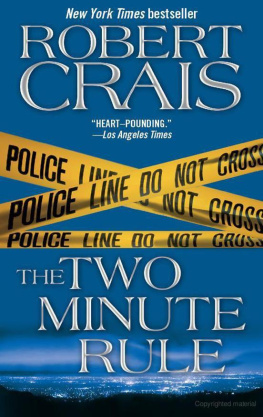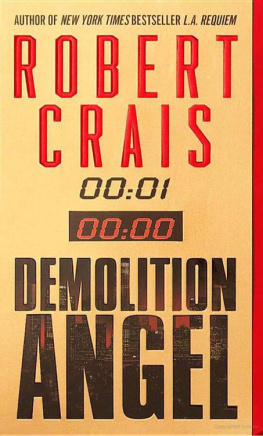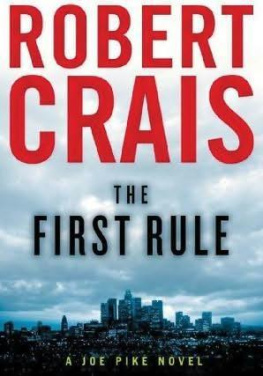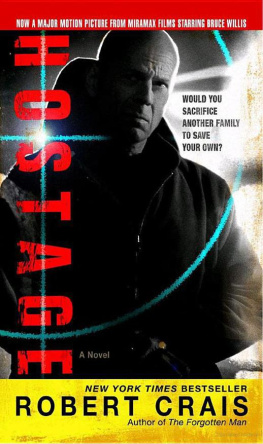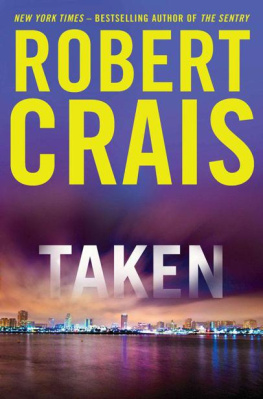Robert Crais - The Two Minute Rule
Here you can read online Robert Crais - The Two Minute Rule full text of the book (entire story) in english for free. Download pdf and epub, get meaning, cover and reviews about this ebook. year: 2007, publisher: Pocket STAR Books, genre: Detective and thriller. Description of the work, (preface) as well as reviews are available. Best literature library LitArk.com created for fans of good reading and offers a wide selection of genres:
Romance novel
Science fiction
Adventure
Detective
Science
History
Home and family
Prose
Art
Politics
Computer
Non-fiction
Religion
Business
Children
Humor
Choose a favorite category and find really read worthwhile books. Enjoy immersion in the world of imagination, feel the emotions of the characters or learn something new for yourself, make an fascinating discovery.
- Book:The Two Minute Rule
- Author:
- Publisher:Pocket STAR Books
- Genre:
- Year:2007
- Rating:5 / 5
- Favourites:Add to favourites
- Your mark:
- 100
- 1
- 2
- 3
- 4
- 5
The Two Minute Rule: summary, description and annotation
We offer to read an annotation, description, summary or preface (depends on what the author of the book "The Two Minute Rule" wrote himself). If you haven't found the necessary information about the book — write in the comments, we will try to find it.
The Two Minute Rule — read online for free the complete book (whole text) full work
Below is the text of the book, divided by pages. System saving the place of the last page read, allows you to conveniently read the book "The Two Minute Rule" online for free, without having to search again every time where you left off. Put a bookmark, and you can go to the page where you finished reading at any time.
Font size:
Interval:
Bookmark:
| Published: | 2010 |
The Two Minute Rule (2006)
Robert Crais
*
PROLOGUE:
MARCHENKO AND PARSONS circled the bank for sixteen minutes, huffing Krylon Royal Blue Metallic to regulate the crystal as they worked up their nut. Marchenko believed Royal Blue Metallic gave them an edge in the bank, made them fierce and wild-eyed, Royal Blue being a warrior's color; Parsons just enjoyed the spacey out-of-body buzz, like being separated from the world by an invisible membrane.
Marchenko suddenly slapped the dash, his wide Ukrainian face purple and furious, and Parsons knew they were on.
Marchenko screamed, "Let's get this bitch DONE!"
Parsons jerked the charging bolt on his M4 rifle as Marchenko swerved their stolen Corolla into the parking lot. Parsons was careful not to place his finger on the trigger. It was important not to fire the weapon until Marchenko gave the word, Marchenko being the leader of their little operation, which was fine by Parsons. Marchenko had made them both millionaires.
They turned into the parking lot at seven minutes after three that afternoon, and parked near the door. They pulled on black knit ski masks as they had twelve times before, rapped their gloved fists together in a flash of esprit de corps, now both shouting in unison like they meant it--
"Get this bitch DONE!"
They pushed out of the car, the two of them looking like black bears. Marchenko and Parsons were both decked out in matching black fatigues, boots, gloves, and masks; they wore load-bearing gear over armored vests they had bought on eBay, with so many extra magazines for their rifles bristling from their vests that their already bloated bodies looked swollen. Parsons carried a large nylon bag for the money.
Broad daylight, as obvious as two flies in a bowl of milk, Marchenko and Parsons sauntered into the bank like two WWF wrestlers casually entering the ring.
Parsons never once thought the police might show up or that they would be caught. The first couple of times they took over a bank he had worried, but this was their thirteenth armed bank robbery, and robbing banks had turned out to be the easiest money either of them had ever made: these banking people, they flat out just gave you the money, and security guards were a thing of the past; banks didn't employ rent-a-cops anymore because the liability costs were too high--all you had to do was step through the doors and take what you wanted.
As they entered the bank, a woman in a business suit was on her way out. She blinked at them in their black commando gear and guns, and she tried to reverse course, but Marchenko grabbed her face, kicked her legs out from under her, and pushed her down to the floor. Then he raised his rifle and shouted as loud as he could.
"This is a robbery, you muthuhfuckuhs! We OWN this fuckin' bank!"
That being Parsons' cue, he raked the ceiling with two horrific bursts from his rifle that knocked loose ceiling tiles and shattered three rows of lights. Shrapnel, debris, and ricochets spattered the walls and pinged off desks. Spent casings streamed from his rifle, tinkling like silverware at a furious feast. The noise of his automatic weapon's fire was so loud in the enclosed space that Parsons never heard the tellers scream.
Their thirteenth bank robbery had officially begun. The clock was running.
Lynn Phelps, the third woman waiting in line for a teller, startled at the sound of the gunfire like everyone else, then dropped to the floor. She grabbed the legs of the woman standing behind her, pulled her down, then carefully checked the time. Her Seiko digital showed three-oh-nine, exactly. Nine minutes after three. Time would be critical.
Mrs. Phelps, sixty-two years old, was overweight, dowdy, and a retired sheriff's deputy from Riverside, California. She had moved to Culver City with her new husband, a retired Los Angeles police officer named Steven Earl Phelps, and had been a customer at this branch for only eight days. She was unarmed, but would not have reached for her weapon if she had been carrying it. Lynn Phelps knew the two A-holes robbing her bank were not professionals by the way they wasted time waving their guns and cursing rather than getting down to the business of stealing money. Professionals would have immediately grabbed the managers and had the tellers dump their drawers. Professionals knew that speed was life. These A-holes were clearly amateurs. Worse, they were amateurs who were armed to the teeth. Professionals wanted to get out alive; amateurs would kill you.
Lynn Phelps checked the time again. Three-ten. One minute had passed, and these two idiots were still waving their guns. Amateurs.
Marchenko shoved a Latino man into a counter laden with deposit slips. The man was short and dark, with baggy work clothes streaked with white paint and dust. His hands were dusty and white, too. Parsons thought the guy had probably been installing drywall before he came to the bank. The poor bastard probably didn't speak English, either, but they didn't have time for language lessons.
Marchenko screamed, "Get your fucking ass DOWN!"
With that, Marchenko butt-stroked the guy with his rifle. The man's head split and he slumped onto the counter, but he didn't go down, so Marchenko hit him again, knocking him to the floor. Marchenko spun away, his voice furious and his eyes bulging out of the ski mask.
"Everybody stay on the floor. Anyone gives us any shit you better kiss your ass good-bye. C'mere, you fat cow!"
Parsons' job was easy. He kept an eye on everyone, and kept an eye on the door. If new people walked in, he grabbed them and shoved them down. If a cop walked in, he would ace the fucker. That's the way it worked. And he shook down the tellers while Marchenko went for the key.
Banks kept their cash in two places, the teller drawers and the cash locker in the vault. The manager had the key to the cash locker.
While Marchenko got the customers on the floor, Parsons whipped out his nylon bag and confronted the tellers. It was an easy mid-afternoon scene: four tellers, all young Asian and Middle Eastern women, and an older broad at a desk behind the tellers who was probably the manager. Another banker who was probably a loan officer or assistant manager sat at one of the two desks on the public side of the tellers.
Parsons made his voice fierce like Marchenko and waved his gun. His gun scared the shit out of these chicks.
"Stand away from the counter! Step back, goddamnit! Stand up! Don't get down, fuckin' bitch! Stand UP!"
One of the tellers, already crying, had dropped to her knees, the dumb bitch. Parsons leaned across the counter, jabbing his gun at her.
"Get up, you stupid bitch!"
Behind him, Marchenko had pulled the desk jockey to his feet, screaming for the manager.
"Which one of you has the key? Goddamnit, who's the manager? I gotta fuckin' cap your ass, I will!"
The woman at the desk behind the tellers stepped forward, identifying herself as the manager. She raised both hands to show her palms, walking slowly forward.
"You can have the money. We're not going to resist you."
Marchenko shoved the one he had down, then stalked around the pass-through behind the tellers. While he took care of his end, Parsons ordered the tellers to step forward to their stations and warned them not to trip the alarms under their counters. He told them to dump their drawers on their desks and leave out the fuckin' dye packs. He held his rifle in his right hand and the bag in his left. He ordered them to put their cash into the bag. Their hands shook as they did it. Each and every one of them trembled. Their fear gave Parsons an erection.
He had a problem with the stupid bitch on the floor. She wouldn't get up. She didn't seem able to control her legs or even to hear his commands. He wanted to jump over the counter and beat the bitch silly until the next teller offered to empty her drawer.
Font size:
Interval:
Bookmark:
Similar books «The Two Minute Rule»
Look at similar books to The Two Minute Rule. We have selected literature similar in name and meaning in the hope of providing readers with more options to find new, interesting, not yet read works.
Discussion, reviews of the book The Two Minute Rule and just readers' own opinions. Leave your comments, write what you think about the work, its meaning or the main characters. Specify what exactly you liked and what you didn't like, and why you think so.

